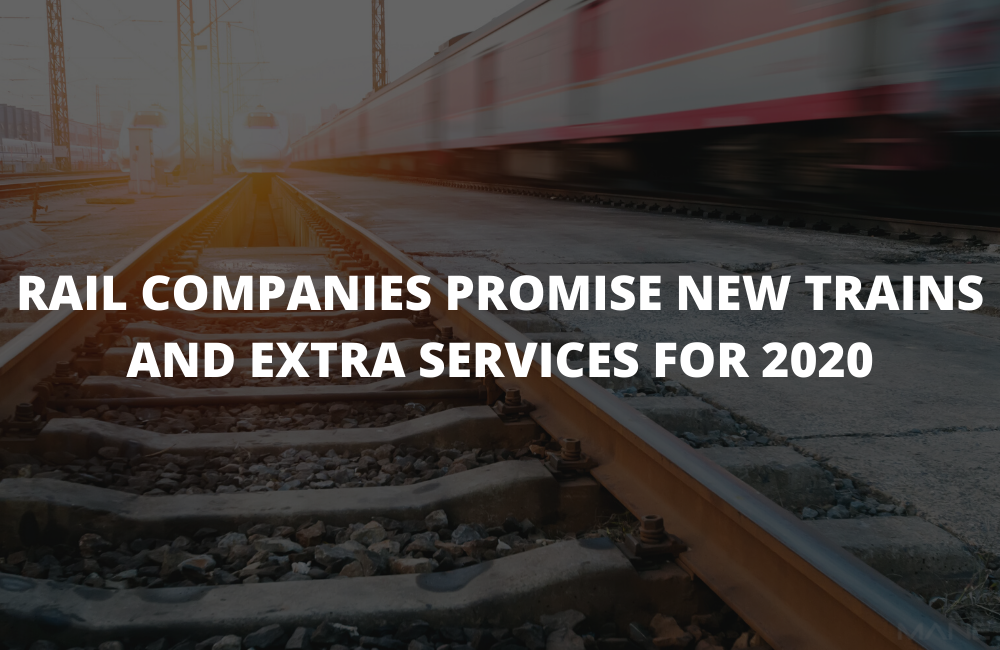Rail Companies Promise New Trains and Extra Services for 2020
31 Jan, 202010 minsBritain’s rail companies have published a 2020 investment report promising over 1,000 extra ...

Britain’s rail companies have published a 2020 investment report promising over 1,000 extra services a week and 1,000 new carriages. The total cost of railway services and upgrades in 2020 is predicted to be a cool £20 billion.
Some of the improvements we can expect next year are:
Scotland: Completion of major redevelopment of Glasgow Queen Street Station for £120 million, and a start on the redevelopment of Aberdeen Station.
Northern England: new and upgraded trains for Merseyrail, TransPennine Express, LNER, Hull Trains, Northern and Grand Central.
Wales: An ongoing £40 million train refurbishment programme and 186 more Sunday train services.
Midlands: A half-hourly shuttle train from Corby to St Pancras International, 180 new trains to and from Birmingham (with space for 50,000 extra passengers) and the opening of Wolverhampton Interchange as part of a £150 million transport hub.
East Anglia: 169 new trains on Greater Anglia for a cost of £1.4 billion, plus a £27 million route upgrade to allow longer trains to travel between Cambridge and King´s Lynn. Track upgrades will enable 10 extra freight trains to run to Felixstowe every day, replacing up to 760 lorries on the road.
South West: A new timetable with faster, more regular services, plus an £80 million upgrade of the Dawlish sea wall.
London and Southern England: 90 new trains on South Western Railway and the start of a £150 million upgrade for Gatwick Airport station.
This investment report builds on the rail industry’s long-term plan to upgrade passenger and freight services, which was published two years ago. Since then we’ve seen major progress, including the introduction of over 2,500 new carriages and over 4,000 new weekly services.
Rail operators have also made additional commitments to add over 11,300 extra trains a week to timetables by the mid-2020s, an increase of nearly 10%. Over the same period they also plan to add 8,000 new train carriages with more seats and better wi-fi - an increase of 1,000 on previous plans. To put it in perspective, that’s like replacing over half Britain’s trains with new ones. Hundreds of old carriages have also been refurbished.
98p in every pound spent on tickets goes back into running and improving the railway. Thankfully, passenger numbers have doubled in the last two decades, so fares are now almost enough to cover these costs, a dramatic change from a £2bn operating deficit in the late 1990s.
The railway underpins Britain’s economic success, with 1.4 million people travelling into cities by rail every weekday, and £30bn worth of goods delivered by freight trains every year. With Brexit now a certainty after Boris Johnson’s landslide election victory, improving the rail network will be vital to help our economy thrive outside the EU.
With 4.8 million rail journeys made every day and three trains leaving a station every second, the network is already congested and adding to those numbers will be challenging. Rail companies are collaborating to make sure the new services are introduced smoothly and the whole country feels the benefits of this huge investment.
News of the investment plan comes as the independently-led Williams review into the railway gets ready to give its final report and recommendations. The rail industry offered a submission to this review with radical proposals to reorganise the railway, make the fares system easier and increase accountability.


